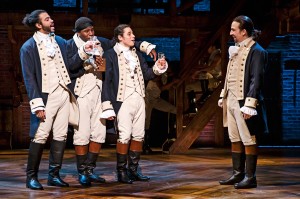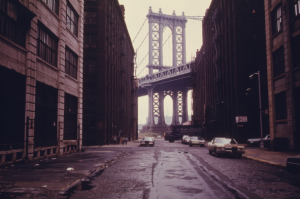10/09 Episode: THE STOP
You’re driving. Maybe you’re speeding. Maybe you don’t think you’re doing anything wrong. All of a sudden blue lights flash in your rearview mirror. Your stomach drops. You’ve been stopped. It’s a feeling we all know. But what’s it like for the police officers who make the stops?
“I have been doing this for 11 years… and every time I make a traffic stop, the hair on the back of my neck stands up,” says Birmingham police officer Julian Roberson.
This week, we follow Life of the Law Reporter Ashley Cleek as she goes in search of the legal ins and outs and the split-second decisions behind each traffic stop. Listen to THE STOP, here.
Reporter’s Notebook: Ashley Cleek
The whole summer, we at Life of the Law, joined people throughout the country watching as video after video showed traffic stops gone horribly wrong. What was happening? Why were traffic stops such charged situations?
To understand a traffic stop, I wanted to see a stop from both points of view, the police and the civilian. I went on two ride-alongs, one in the small town of Anniston, Alabama, and the other in Birmingham.
In Birmingham I rode for four hours with Officer Julian Roberson. Roberson is a traditional beat cop. He makes traffic stops, but he also answers calls, like the one from a woman who was calling to report a man sitting on his porch listening to music too loud. Roberson’s beat does involve a lot of drugs and some crime. At one point, we sit in the parking lot of a Dollar Store for about half an hour because the cashiers are worried about break-ins. Roberson is constantly, scanning.
In his police SUV, he is a presence. But he’s careful not to be oppressive. Both Roberson and another officer I interviewed, James Harrington, spoke about how parents constantly threaten their kids that if they are bad “the police will come and get them.” Both men said they were deeply disturbed when they heard parents talk like this. They want to be members of the community who people rely on in times of need, not ‘boogeymen.’
Roberson has felt the tension in the community increase over the summer. As we drive down one street, a man walks slowly down the middle of the road. When he sees Roberson’s car, he throws his hands up in the air, as in ‘hands up; don’t shoot’ (the rallying cry of demonstrators following the police shooting of Michael Brown in Ferguson). Roberson rolls down the window and waves. The man keeps his hands raised.
As we cruised through the projects in North Birmingham, it was hard not to feel an oppressive presence. Roberson would shine his spotlight in alleyways and cruise past teenagers hanging out on concrete stoops. Roberson said he understood that some citizens might feel oppressed and uneasy as he drives by.. Roberson didn’t grow up in the projects, but he is originally from Bessemer, a small city outside of Birmingham. Roberson says that the older generation likes to see the police cruising around. He might be right. One older woman yelled “Thank you!” to Roberson from across the street .
I also interviewed Ronald Rich. I met Rich at his mom’s house, a one-story project in East Birmingham. Everyday Rich says, he sees cop cars cruise through the neighborhood. He says he’s exhausted by the constant police presence. The morning we met, Rich said a police car had driven by and even though no one in his family was in any trouble, everyone got up from the porch and went inside.
Rich says that black officers treat black men like himself with less respect than a white officer would treat him. I ask Roberson about this. He says that black men show white officers more respect than they show him. Likely, they are both right.
This is the line that separates a traffic stop. One side sees a situation one way, the other sees the opposite. With THE STOP we want to show both sides of the line, and take you to a single small moment when the divide, is conquered.
![]()
A Review: HAMILTON, the musical
Life of the Law’s Advisory Scholar Anna-Maria Marshall reviews the musical everyone’s talking about… HAMILTON.
I was sitting right up front, in the fourth row, the night I saw Lin-Manuel Miranda’s musical, Hamilton. In reviews of the show, I had read about the “Cabinet Battles” – debates between Alexander Hamilton and Thomas Jefferson while they were in Washington’s Cabinet, depicted as rap battles between two eloquent opponents. “Cabinet Battle #1” is about whether or not the federal government should assume the states’ debts as a means of securing credit for the fledgling nation. As the song began, I started clapping enthusiastically – I’m a fool for Hamiltonian financial policy. Just at that moment, Miranda (playing Hamilton) swung around, saw me, and winked.
Alexander Hamilton winked at me! I almost swooned. In an 18th century kind of way.
I have to admit that I swooned quite a lot when I read Ron Chernow’s biography of Hamilton several years ago – Chernow gets a credit in the show’s creative team. Growing up in New Jersey, my first memory of Alexander Hamilton is as a name on a rest stop on the Turnpike, near Weehawken where Burr killed him. (In a life riven with indignities, surely this one’s Hamilton’s worst.) Later on, I got to admire him as an adversary of Thomas Jefferson’s. (I don’t want to spill too much ink on TJ here, but before you go all misty about the Declaration of Independence, please read Section 1 of the Virginia Declaration of Rights, written by George Mason, and then come back for a chat about Jefferson’s copy editing skills.) And of course, like every good political science major, I read The Federalist Papers, though most of my professors insisted that the best ones were written by James Madison.
Sadly, Hamilton’s omission from popular history is pretty typical. We barely know anything about him for reasons that are obvious. He died too young, at the age of 47, and did not have a chance to tell his story for posterity. Moreover, his political enemies – Jefferson, Madison, and John Adams – lived to ripe old ages and never tired of portraying Hamilton as the villain of the revolutionary piece – the monarchist, the oligarch, the pseudo-aristocrat.
Chernow’s account provides an antidote to this P.R. campaign, rendering Hamilton brilliant, swashbuckling, courageous and staggeringly accomplished – the visionary founder of a national economic system that stands today. But Chernow doesn’t sugarcoat – Hamilton is also an arrogant, impulsive, reckless, and horny bastard who creates misery for many around him, including those who loved him most. In short, he was fully human, which brings his brilliance down to earth. After reading the book, I became a “Helpless”Hamilton fangirl. And my endlessly patient husband, listening to me repeat passages every night, repeatedly said “Someone ought to make a movie.”
Lin-Manuel Miranda did better than that; he wrote Hamilton, which deserves its unanimously rave reviews. Many have written about how the show contemporizes the American Revolution and Hamilton’s role in it. The hip-hop score translates centuries-old political conflict into a vernacular whose emotion is familiar to a modern and (importantly) youthful audience. The outstanding, mesmerizing multicultural cast reminds us – at a time when we sorely need reminding – that most of us have origins in some other country. And if we cringe when Trump makes fun of Rand Paul’s haircut, well, the early days of the Washington Administration made Trump look gracious by comparison.
Through all three hours of the show, Miranda captures the complexity and contradictions and sheer genius of his subject. And Miranda should understand about genius, given his recent official designation from the MacArthur Foundation. What came as a shock to me, though, was how through song and performance, Miranda managed to reveal new ways of thinking about Hamilton’s life and times. Hamilton rocketed to success as Washington’s“Right Hand Man,” where his organizational skills helped sustain the ragtag Continental Army. While logistics are hardly the stuff of musical theatre, Miranda’s stirring staging situates Hamilton’s service in the middle of a war (BOOM!), and emphasizes Hamilton’s meteoric rise through the ranks. In “The Room Where It Happens,” Aaron Burr’s ambition and jealousy are channeled into a frantic dance where Leslie Odom, Jr.’s leaps and twists embody Burr’s troubled mind and thwarted career. And Washington’s Farewell Address(“One Last Time”) is a beautiful and melancholy duet, capturing the genuine collaboration between Washington and Hamilton in its composition and ending with some actual passages of the address. Oh, and I promised myself I wasn’t going to talk about him, but Miranda’s Jefferson? He’s foppish and out-of-touch and kind of ridiculous (“What Did I Miss?”). Delightful!
No less important in the show is Hamilton’s personal life. Just like the chorus observing Hamilton’s affair with Maria Reynolds in “Say No to This,” I had my hands over my face while reading Chernow’s account of this tawdry business. And his wife, Eliza’s song in the aftermath is heartbreaking (“Burn”). But poor Eliza had more heartbreak ahead. Their eldest son, Philip, was killed in a duel, defending his father’s honor, and then, of course, her husband died a few years later in the same pointless way. Eliza lived another 50 years after Hamilton’s death, spending her remaining years collecting his papers, opening orphanages to honor his humble origins, preserving his legacy. Generously, Miranda gives her the last, beautiful word in the play . . . although I couldn’t help but think that Alexander, looking down, might be a little miffed. Obviously, in his own way, he adored Eliza and would have approved her central role in the show. But the last word? For one as voluble as Alexander Hamilton . . . I’m not so sure he would have agreed to that. I’m glad he wasn’t around to quibble with Miranda.
It is both ironic, and to me, terribly sad that the Founder that would have been most at home in 21st century America is the one that we know the least about. So it delights me that Miranda is bringing Alexander Hamilton to what will undoubtedly be generations of people from all walks of life who will see and hear his story for the first time. What a stirring introduction!
Anna-Maria Marshall has a J.D. from the University of Virginia School of Law, and a Ph.D. in Political Science from Northwestern University. She is currently an associate professor and head of the Sociology Department at the University of Illinois.
![]()
LIVE LAW: Truth or Dare? Brooklyn – Nov. 3
Life of the Law’s Mary Adkins (NY Times, The Atlantic), Joselin Linder (This American Life), Alex DiFrancesco (Author of The Devils That Have Come to Stay) and other surprise special guests.
Doors open at 6:30. Stories begin at 7:30. Admission is $10 in advance, $15 on day of the show online and at the door. Get your tickets here.
Join Life of the Law’s producers, editors, reporters, storytellers, scholars and friends on Tuesday night, November 3 at Brooklyn’s The Knitting Factory, 361 Metropolitan Avenue.
![]()
LOTL Staff: Best of Reading
This week we hand the microphone over to three of our team members for their reading recommendations.
Jonathan Hirsch:
This story on KUOW in Seattle, My Grandfather and the Plane That Changed Seattle,weaves together personal history, the history of Seattle, Boeing, WWII, and the people who built the planes that won the war. The story reveals a side of history that is rarely featured..how African American women played a critical domestic role in the war. The text is just as lovely as the reporting.
*Full disclosure: I helped Jim Gates produce this story.
Kirsten Jusewicz-Haidle:
I was raised Catholic and while I may not still be a practicing Catholic, I find the Vatican and Pope Francis fascinating. I always jump at the chance to get more information on the Vatican and how it works!
Donald Trump infuriates me, yet I find his current rise to the top intriguing. I couldn’t stop reading about this man trying to get a acloser look at the man and the campaign behind the madness.
I picked up the first issue of this comic on a whim and when I finished, I immediately went out and got all the rest. This series takes place in a dystopian future where men rule all and women, who don’t fit norms, are locked away on Bitch Planet forever. Frankly, it looks at feminism and racial politics in the most radically honest way I’ve seen and between the story and the extra essays, I haven’t stopped thinking about it in months.
This is, first of all, a great biography, full stop. But, it’s also a fascinating look into the life of Cornelius Vanderbilt, a notoriously private man who helped to shape modern capitalism, perhaps more than any one else.
Jim Gates:
At the moment I am reading We Are Not Ourselves the debut novel by Matthew Thomas. It is a multi-generational look at an American-Irish family as they work to build a better life. Thomas explores everything from marriage to adolescence to mental health. But with the passing of each generation there is a shadow of pain and emotional baggage that is carried from one family to the next. The characters themselves might not see it, but Thomas’ writing slices into these undertones and lays them out heartbreakingly bare. His prose is beautiful, poignant and moving.
![]()
Stay tuned for next week’s LIVE LAW story: Narcoleptic Lawyer













